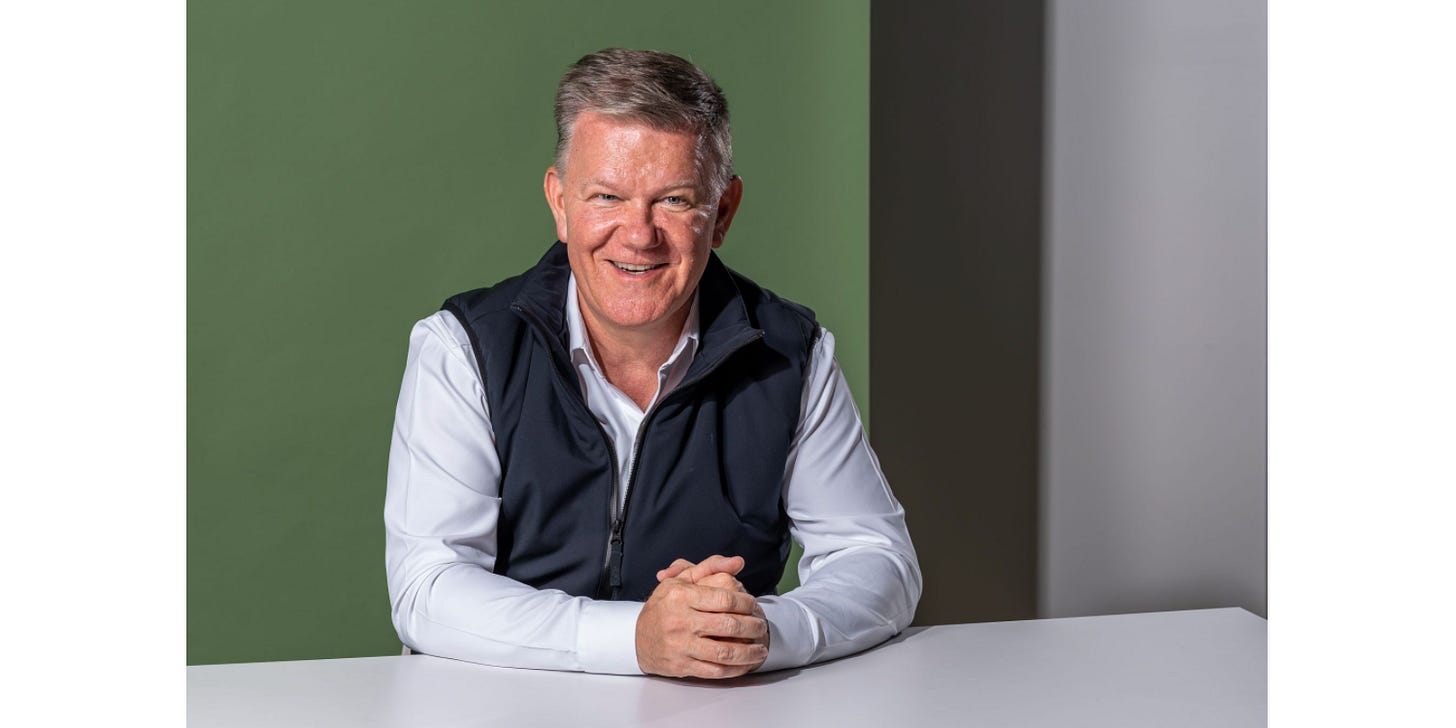This article is part of Fintech Leaders, a newsletter with almost 60,000+ dreamers, entrepreneurs, investors, and students of financial services. I invite you to share and sign up! And, if you enjoy this conversation, please consider leaving a review on Apple Podcasts, Spotify, or wherever you get your shows so more people can learn from it.
Live Recording Alert!
Join us October 16 for a live Fintech Leaders recording and Happy Hour with Stuart Sopp, CEO & Co-Founder of Current, a multibillion-dollar fintech built in New York City.
See you at Barclays Rise New York on Monday, October 16 to kick off New York Tech Week.
I sat down with Colin Walsh, CEO & Co-Founder of Varo Bank, a neobank and the first consumer fintech to be granted a bank charter in the US. In a past life, Colin held leadership positions at American Express, Lloyds Banking Group, Wells Fargo, and was on the board of Visa Europe. You can also learn more about Colin and Varo in his own podcast, the Varo Prosperity Podcast.
Varo has raised close to a billion dollars and is backed by Blackrock, David Rubenstein’s Declaration Partners, Warburg Pincus, and a long list of investors.
In this episode, we discuss:
Finding Product Market Fit and why this process can often take years
“In the early days, we were probably focused on the younger audience, we call them cash-strapped millennials… and it was actually in early 2018… And we realized how broad and how deep the audience was that we could potentially serve was. And it wasn't just cash-strapped Millennials in their 20s. Our average customer age is actually 34-35.”
Colin had Initially anticipated that achieving product-market fit would take only months. The reality revealed that it usually takes years to develop a comprehensive product that resonates with customers and includes all necessary features. Additionally, while developing and refining their product, Varo Bank also pursued a banking license, which meant they had to create a proof of concept product with a sponsor bank, and ultimately transition customers to their own banking platform post-approval.
Advantages and disadvantages of being a regulated institution and why Colin is proud that Varo secured a banking charter
“The advantages of being a regulated institution, far outweigh the extra costs and complexity…”
Securing a de novo banking charter is challenging, with many fintechs failing to secure one or having to buy an existing banking institution. Not only that, but the current economic reality has made regulators more cautious about granting new charters, leading to a slowdown in approvals. Given Colin's experience in the regulated system, he believes the benefits of being a regulated institution far outweigh the associated complexities. He explains that regulation provides the bank with access to essential systems and enables them to offer and quickly ship a wide range of products to support customers in their financial journey – including access to multiple payment rails, savings and wealth-generation tools, and credit products.
Making tough decisions and how Varo redefined itself over the last couple of years
“You have to do it, if you have to do it. What's super important is to extend your runway, make sure you have sufficient capital to get yourself to profitability, or at least certainly get to metrics that would allow you to reasonably raise more capital… And you have to treat people with respect and dignity. You have to over-communicate, you also have to help people who are not let go and sort of stay engaged and believe in the future.”
As soon as the funding environment changed in 2022, it forced Varo to look inward and quickly course-correct. First, they closed many inactive accounts, signaling a shift from the "grow at all costs" mindset. This prioritized quality and active engagement over just boasting large customer numbers. Next, they realized they had over-hired a large number of employees and were forced to pull back and, unfortunately, let go of staff. Walsh acknowledges he was fully bought into the over-enthusiasm and the repercussions of buying into the hype cycle. When tough decisions are made, especially regarding layoffs, Colin’s advice is it's crucial to communicate effectively and treat all employees with respect and dignity. Importantly, for the remaining staff, it's essential to re-engage them, make them believe in the company's mission again, and help them navigate the emotional toll of seeing colleagues let go, especially in a remote working environment.
Colin’s take on the big re-bundling of fintech… and a lot more!
“FinTech 2.0 is really about re-bundling because customers don't want 12 apps on their phone, they don't want to have to hack together a money management system, which many of them do, because they don't have a sort of comprehensive operating system”
Fintech 1.0 has been focused on individual solutions to address specific customer needs (e.g., Robinhood, Cash App, Venmo), but companies like Square (now Block), SoFi, or Nubank have managed to diversify by first addressing an initial need and then branching out across multiple products. As FinTech evolves, the shift towards re-bundling will only accelerate since customers don't want multiple apps to manage their finances. They prefer comprehensive financial "operating systems" that cater to numerous needs. Colin argues that core transaction accounts, where paychecks are deposited and bills are paid, are the foundation for building consumer trust. Once trust is established, introducing additional features such as savings, credit, or cashback solutions results in higher customer engagement. According to Walsh, Varo has seen strong customer engagement and trust, evidenced by their high NPS scores.
Want more podcast episodes? Join me and follow Fintech Leaders today on Apple, Spotify, or your favorite podcast app for weekly conversations with today’s global leaders that will dominate the 21st century in fintech, business, and beyond.
Previous Episodes You May Enjoy:
Video Highlights You Will Definitely Like:
Miguel Armaza is Co-Founder & Managing General Partner of Gilgamesh Ventures, a seed-stage investment fund focused on fintech in the Americas. He also hosts and writes the Fintech Leaders podcast and newsletter.



























Share this post